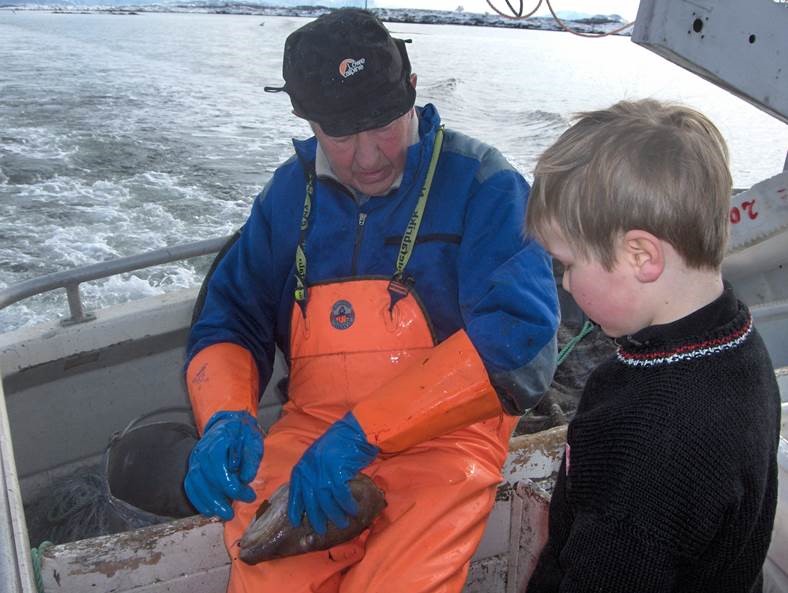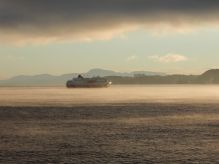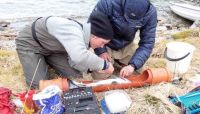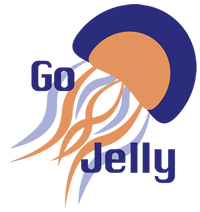Marine environment, society and sustainability - Ocean science and technology

Knowledge for the analysis of ocean science and technology in a societal, environmental and sustainable perspective.
Knowledge areas
- Governance
- Security and reliability
- Environmental analysis
- Communication and dissemination
- Value chain analysis
- Maritime history
- Safety and risk management
NTNU Oceans Pilot - Norway as a sea nation
 The pilot study is a multidisciplinary research activity where researchers and doctor students collaborate to cope with the complex societal interactions in changing coastal communities. It is initiated by NTNU Oceans, aiming at establishing a deeper knowledge base of the dynamic interplay between education, identity, society and industry across generations in coastal communities.
The pilot study is a multidisciplinary research activity where researchers and doctor students collaborate to cope with the complex societal interactions in changing coastal communities. It is initiated by NTNU Oceans, aiming at establishing a deeper knowledge base of the dynamic interplay between education, identity, society and industry across generations in coastal communities.
HAVANSVAR Humanities Ocean Initiative – NTNU Oceans Pilot on Ethical, Social and Cultural aspects of Ocean Research and Innovation
 Technological development changes nature, but thereby we also change human living conditions. How can we secure a responsible and sustainable utilisation of ocean resources, promoting better living conditions within the limits of nature? What “responsible and sustainable utilization of ocean resources” might mean and entail is the topic of current as well as past discourses in politics, business, technoscience and the wider public. HAVANSVAR Humanities Ocean Initiative addresses this question by investigating how our values and attitudes, our ways of seeing and relating to the ocean, change through, and affect the development of new technology. HAVANSVAR Humanities Ocean Initiative builds on the unique infrastructure of cross-disciplinary research at NTNU and establishes a humanities-based research platform for critical examination and problematization of the societal, economic and environmental aspects concerning human utilization of the ocean.
Technological development changes nature, but thereby we also change human living conditions. How can we secure a responsible and sustainable utilisation of ocean resources, promoting better living conditions within the limits of nature? What “responsible and sustainable utilization of ocean resources” might mean and entail is the topic of current as well as past discourses in politics, business, technoscience and the wider public. HAVANSVAR Humanities Ocean Initiative addresses this question by investigating how our values and attitudes, our ways of seeing and relating to the ocean, change through, and affect the development of new technology. HAVANSVAR Humanities Ocean Initiative builds on the unique infrastructure of cross-disciplinary research at NTNU and establishes a humanities-based research platform for critical examination and problematization of the societal, economic and environmental aspects concerning human utilization of the ocean.
The high seas and the deep oceans:
Representations, resources and regulatory governance (3ROceans)
While the ecological and regulatory problems are widely acknowledged, the governance of the sea remains inadequate to address global and multifarious challenges. The problems are particularly acute for the area that lies beyond national borders and jurisdiction, i.e. the high seas and the deep ocean. The challenges related to the use and regulation of this area are fundamentally shaped and influenced by cultural conditions and perceptions.This project seeks to chart and analyze how cultural conditions underpin the use of the oceans and to investigate the relationships between the representations, resources and regulations of the high seas and the deep oceans. An interdisciplinary effort will link the studies of aesthetical formations with their concomitant implications for legal and regulatory development across historical time and space.
CHASES
 This project will explain how land-use change and other human activities may alter life history strategies in salmonids and hence the ecosystem services that they provide and human communities depend on. The main aim is to reveal underlying differences between resident and anadromous individuals, and estuarine and fjord feeding strategies, in a salmonid species. The second aim is to test the hypothesis that marine residency and/or growth rate are impacted when marine environmental conditions are deteriorated. Furthermore, the study will evaluate the ecosystem services potentially generated by anadrome fish populations and whether and to what extent these ecosystem services may change in the event of changing the life history strategies. (2016-2020)
This project will explain how land-use change and other human activities may alter life history strategies in salmonids and hence the ecosystem services that they provide and human communities depend on. The main aim is to reveal underlying differences between resident and anadromous individuals, and estuarine and fjord feeding strategies, in a salmonid species. The second aim is to test the hypothesis that marine residency and/or growth rate are impacted when marine environmental conditions are deteriorated. Furthermore, the study will evaluate the ecosystem services potentially generated by anadrome fish populations and whether and to what extent these ecosystem services may change in the event of changing the life history strategies. (2016-2020)
Circular Ocean
 Circular Ocean is a EC supported project (2016-2018) seeking to inspire enterprises and entrepreneurs to realise the opportunities of discarded fishing nets in the Northern Periphery & Arctic (NPA) region, and hence put the increasing levels of marine litter to a stop. Through transnational collaboration and eco-innovation Circular Ocean will develop, share and test new sustainable solutions to incentivise the elimination, collection and, reprocessing of discarded fishing nets and assist the movement towards a more circular economy.
Circular Ocean is a EC supported project (2016-2018) seeking to inspire enterprises and entrepreneurs to realise the opportunities of discarded fishing nets in the Northern Periphery & Arctic (NPA) region, and hence put the increasing levels of marine litter to a stop. Through transnational collaboration and eco-innovation Circular Ocean will develop, share and test new sustainable solutions to incentivise the elimination, collection and, reprocessing of discarded fishing nets and assist the movement towards a more circular economy.
COLUMBUS
 The COLUMBUS project intends to capitalise on the European Commission’s significant investment in marine and maritime research by ensuring accessibility and uptake of research Knowledge Outputs by end-users: policy, industry, science and wider society. COLUMBUS will ensure measurable value creation from research investments contributing to sustainable Blue Growth within the timeframe of the project. Download the latest newsletter. (2015-2018)
The COLUMBUS project intends to capitalise on the European Commission’s significant investment in marine and maritime research by ensuring accessibility and uptake of research Knowledge Outputs by end-users: policy, industry, science and wider society. COLUMBUS will ensure measurable value creation from research investments contributing to sustainable Blue Growth within the timeframe of the project. Download the latest newsletter. (2015-2018)
GoJelly
 The objective of the GoJelly project is to use jellyfish as source of innovative solutions to combat marine litter, in particular microplastic pollution. It aims at developing a microplastics filter for commercial and public use, where the main raw material is jellyfish mucus. In doing so, it addresses the problems of both jellyfish and microplastics, ultimately leading to less plastic in the ocean, a demand for jellyfish raw material, and more jobs for commercial fishermen in off-seasons.
The objective of the GoJelly project is to use jellyfish as source of innovative solutions to combat marine litter, in particular microplastic pollution. It aims at developing a microplastics filter for commercial and public use, where the main raw material is jellyfish mucus. In doing so, it addresses the problems of both jellyfish and microplastics, ultimately leading to less plastic in the ocean, a demand for jellyfish raw material, and more jobs for commercial fishermen in off-seasons.
PLASTOX
 The project on "Direct and indirect ecotoxicological impacts of microplastics on marine organisms" is funded by the Joint Programming Initiative JPI Oceans (2015-2018). It studies the ingestion, foodweb transfer, and ecotoxicological impact of microplastics, persistent organic pollutants (POPs), metals and associated plastic additive chemicals, on key European marine species and ecosystems.
The project on "Direct and indirect ecotoxicological impacts of microplastics on marine organisms" is funded by the Joint Programming Initiative JPI Oceans (2015-2018). It studies the ingestion, foodweb transfer, and ecotoxicological impact of microplastics, persistent organic pollutants (POPs), metals and associated plastic additive chemicals, on key European marine species and ecosystems.
SDSN Northern Europe
The Sustainable Development Solution Network (SDSN) Northern Europe is an action-oriented network focusing on mobilizing Nordic scientific and technological expertise to solve problems and create a more sustainable society. The network links knowledge to action in order for society to achieve the UN Sustainable Development Goals (SDGs). NTNU is a of member of SDSN Northern Europe, and is taking an active part in developing actions to promote sustainable solutions.
SISVI
 SISVI is a competence project funded by industry partners and the Norwegian Research Council. The project focuses on industry needs in order to enhance competitiveness, by implementing sustainable business practices. One of its case studies relates to the recycling of plastic components in the Norwegian fish farming industry. (2014-2018)
SISVI is a competence project funded by industry partners and the Norwegian Research Council. The project focuses on industry needs in order to enhance competitiveness, by implementing sustainable business practices. One of its case studies relates to the recycling of plastic components in the Norwegian fish farming industry. (2014-2018)
Aquaculture industry and learning
This national project (2016-2020) will identify actions, mechanisms and structures promoting learning cultures in the aquaculture industry. The acquired knowledge will provide insights in rationalities for valuing and merging experience and knowledge and reflect characteristics and dynamics in the knowledge society learning cultures. These insights will create a knowledge base for reflection and choice for actors in the aquaculture industry concerning challenges of knowledge, leadership and education and learning. The knowledge will be shared with relevant actors through an active dialogue. Contact: Prof. Jorun Stenøien
